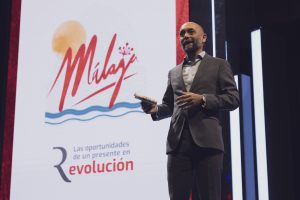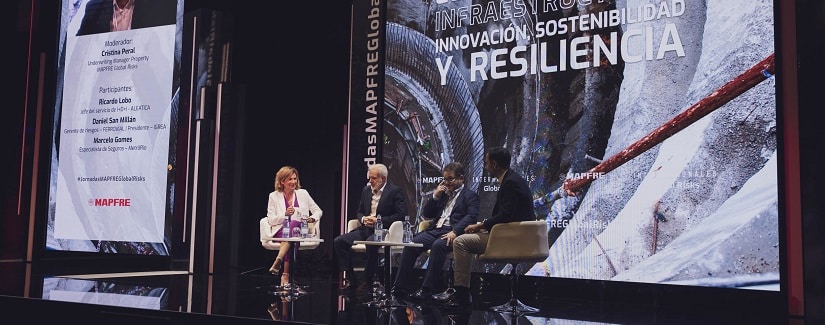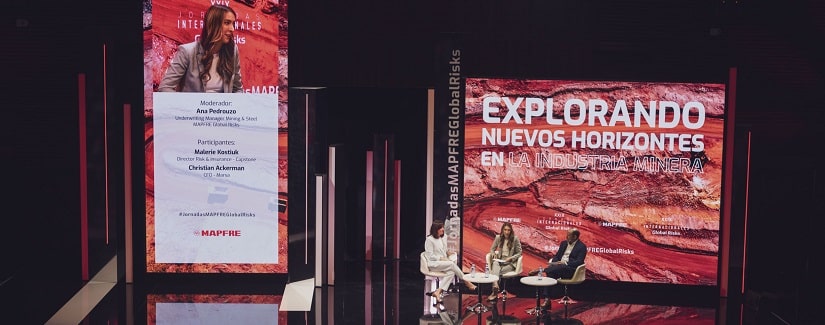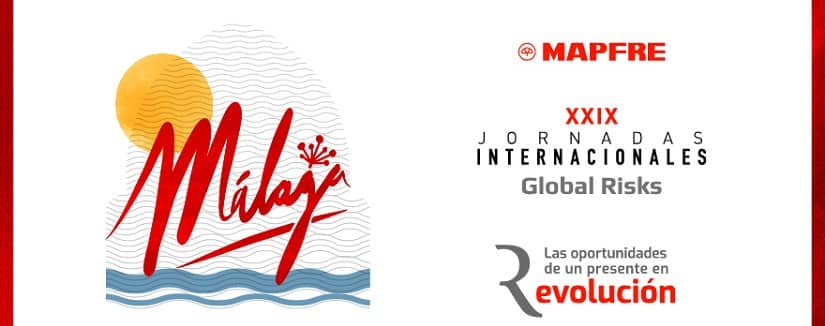Thursday, June 06
 Eduardo Pérez de Lema, Chairman of MAPFRE Global Risks, welcomed the hundreds of attendees who filled the large FYCMA auditorium in Malaga, the city that is hosting the company’s International Workshop on its fifteenth anniversary.
Eduardo Pérez de Lema, Chairman of MAPFRE Global Risks, welcomed the hundreds of attendees who filled the large FYCMA auditorium in Malaga, the city that is hosting the company’s International Workshop on its fifteenth anniversary.
After outlining a present and future scenario with demanding objectives but supported by prudent and sustainable management, he gave way to Bosco Francoy, CEO of the company, who ratified his faith in the success to come and celebrated the good results obtained by the company in a favorable year, although not without difficulties.
To put into context the difficulties faced by the insurance industry, parallel to those of the business fabric, José Luis Jiménez, CFO of MAPFRE, addressed the moment of recovery in advanced economies and the slight slowdown in emerging economies in his speech “Current economic outlook,” and he warned that, although world inflation is falling, it is doing so slowly. He highlighted the case of Europe, whose improvement, in his opinion, is almost “pitiful,” and he correctly predicted that the ECB would give some breathing space by lowering interest rates by 0.25%. MAPFRE, with the competitive advantage of having an international presence in more than 26 countries, believes that prices will not fall as much as is estimated by bodies such as the OECD and that interest rates will remain higher than expected (especially in Europe, which will weaken its currency). He also listed the main factors that are defining this global drift, such as geopolitical risks, natural disasters, the stress of financial markets, and the fragmentation of world trade. Despite the outlook, the expert reminded that “we are learning as crises pass.”
Roundtable discussion. “Reinsurance Market: Is a cycle change on the horizon?”
The first meeting of the workshop was moderated by Miguel Ángel Rosa, CEO of MAPFRE RE, and it analyzed the situation of the reinsurance market with a very broad perspective: that presented by Anthony Phillips, Chairman of Guy Carpenter in Latin America and the Caribbean, and Jim Williamson, Executive Vice Chairman, Chief Operating Officer, and Head of Reinsurance at Everest Re. Everyone agreed on describing a previous market of falling rates, losses, and fluctuations, although they marked 2023 as a turning point in its evolution—Phillips specifically after the devastating hurricane Ian, which ravaged Florida—when rates began to rise, and a completely unprecedented environment has given way to a stable market where companies can obtain coverage in most of the world’s markets.
This interesting paradigm shift was widely discussed among the participants, who also analyzed how increasing natural disasters have become a key element of the reinsurance industry, still pending the incorporation of new techniques for modeling these risks, and the pending technological and cultural development in the prevention of cyber-attacks.

Roundtable discussion: “The Future of Infrastructure: Innovation, Sustainability, and Resilience”
The following conversation was moderated by Cristina Peral, Head of Underwriting for MAPFRE Global Risks’ Property Department, who recalled that, in addition to being an engine of economic and social development, infrastructures are undergoing a major transformation in order to stop being a source of carbon emissions. As pointed out by Ricardo Lobo, Head of Aleatica’s R&D+i Service, they are no longer perennial blocks of concrete and steel, but are now opting for improved materials, a versatile vocation, and a trend towards electrification as opposed to fossil fuels. Along this line, the expert presented an interesting “infinite autonomy” project of vehicles powered by the road itself, whose pilot test is progressing successfully in Portugal.
Another transformative vision came from Daniel San Millán, Risk Manager at Ferrovial, who spoke of interesting initiatives that, although they have not yet reached Europe, have already been successfully implemented in the United States, such as dynamic toll roads that fluctuate according to the fluidity of the free ones, or tools such as ADAPTARE, which makes it possible to assess the impact of major climate risks on large infrastructures. The third expert at the table, Marcelo Gomes da Silva, insurance specialist at MetrôRio, spoke of how his company is firmly aware of the need to provide the millions of passengers traveling through Rio de Janeiro in their cars with the facilities and safety they deserve, based on a model of security and progress, and necessarily covered by the insurance industry.
Roundtable discussion: “Captive Trends in the Insurance Industry”
Carlos Villanueva, Deputy Manager of the Operations and Data Area at MAPFRE Global Risks, moderated this very interesting talk on the situation of the captive market in global risk management, a segment well known to MAPFRE, which works with more than 30 captives. He was joined by the voices of three leading experts: Ignacio Gomar, Supervisor of Corporate Insurance for Naturgy, Diana Beltrán, General Manager of Saphire, and Georges Michelena, supervisor of the Spanish companies of Risk & Reinsurance Solutions. From their different geographical perspectives, it was revealing to hear about the trends of the different regulatory frameworks, the impact of market tightening on the opening and closure of captives, and the strategic importance of this insurance mechanism for many international companies. In this context, everyone acknowledged the importance of highlighting the three key players in this business: the broker, the captive company, and the insurance company.
Roundtable discussion: “AI in Global Risk Management”
 The evening ended with a lively debate on the presence of a technology that is on the rise in our economies: Artificial Intelligence. MAPFRE Global Risks’ AI Supervisor, Diego Bodas, spoke about the important role it plays in an indisputable paradigm shift, which one of the participants, Pablo García Mexía, Director of the Digital Law Practice at Herbert Smith Freehills, described as “the biggest disruptive factor in Europe since the Second World War,” which alters the foundations of the social contract. This legal expert, who listed the significant risks involved in its implementation (from environmental or security risks to discrimination due to bias with an impact on inequality), made an edifying analysis of current regulations and admitted that the positive potential of this technology is enormous.
The evening ended with a lively debate on the presence of a technology that is on the rise in our economies: Artificial Intelligence. MAPFRE Global Risks’ AI Supervisor, Diego Bodas, spoke about the important role it plays in an indisputable paradigm shift, which one of the participants, Pablo García Mexía, Director of the Digital Law Practice at Herbert Smith Freehills, described as “the biggest disruptive factor in Europe since the Second World War,” which alters the foundations of the social contract. This legal expert, who listed the significant risks involved in its implementation (from environmental or security risks to discrimination due to bias with an impact on inequality), made an edifying analysis of current regulations and admitted that the positive potential of this technology is enormous.This roundtable also featured participation by Richard Bejamins, CEO of Odiseia, who pointed out that AI is a transcendental technology with a very long way to go due to its horizontality, which applies to any sector, and that it will not only bring about an industrial revolution, but also a social one, and Juan María Aramburu, co-founder and CEO of Keepler Data Tech, who specifically addressed the importance of data, and of sharing it, as each piece of content is the root of others. Although, he also reminded us that progress and the different uses of AI must advance alongside cybersecurity.
Very soon, in our Risk and Insurance Management magazine, you will be able to read a more extensive summary of each roundtable. Stay tuned!




